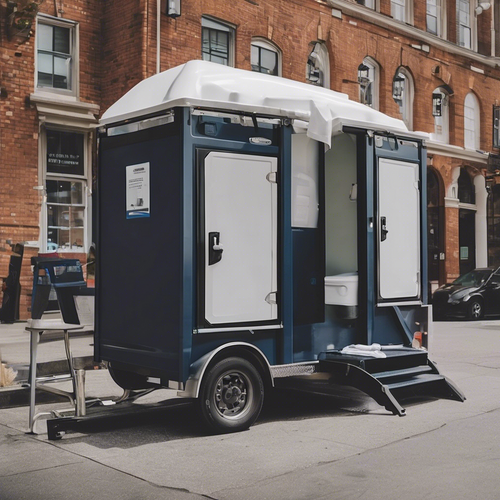Supporting Miami’s Small Businesses: Portable Restrooms for Pop-Up Shops and Markets
The Wynwood Walls are buzzing. Little Havana is pulsing with salsa rhythms. And all across Miami, a vibrant ecosystem of pop-up shops and outdoor markets is injecting energy and entrepreneurship into the city’s economic bloodstream. But beneath the colorful awnings and the enticing aromas, a fundamental need often goes overlooked: accessible and adequate sanitation. For Miami’s burgeoning small business scene, the humble portable restroom 🚽 is proving to be more than just a convenience; it’s a critical infrastructure component.
The Unseen Foundation of Commerce
Imagine browsing handcrafted jewelry at a vibrant street fair on Calle Ocho, only to realize you need a restroom and there isn’t one in sight. This scenario is all too common, and it impacts not only customer comfort but also the viability of the businesses themselves. «People simply won’t stay and shop if they don’t have access to basic facilities,» explains Maria Rodriguez, director of the Miami-Dade Small Business Development Center. «It’s a bottom-line issue.» Research suggests that inadequate restroom facilities can lead to a 20-30% decrease in customer dwell time at outdoor events and markets, directly impacting sales 📉. Providing clean, accessible portable restrooms can significantly boost revenue for vendors.
Navigating the Permitting Maze
Setting up a pop-up shop or market in Miami involves navigating a complex web of regulations. Obtaining the necessary permits for portable restrooms can be particularly challenging. Different municipalities within Miami-Dade County have varying requirements, often involving inspections, placement restrictions, and specific sanitation standards. «The permitting process can be daunting for small business owners, especially those who are just starting out,» says David Chen, a local business consultant specializing in pop-up ventures. «Understanding the code, filling out the applications correctly, and knowing who to contact at the county level – it’s a full-time job in itself 🧑💼.»
Miami-Dade County’s Department of Regulatory and Economic Resources (RER) oversees many of these permits. Business owners need to be aware of requirements related to ADA compliance, waste disposal, and proximity to food vendors. Furthermore, temporary events often require additional permits for water and sewer connections if permanent restroom facilities are not available. Failure to comply with these regulations can result in hefty fines and even the shutdown of the event 🚫.
Accessibility: A Moral and Legal Imperative
Beyond the logistical challenges, accessibility is a crucial consideration. The Americans with Disabilities Act (ADA) mandates that all public accommodations, including temporary events, provide accessible restroom facilities. This means ensuring that at least one portable restroom is wheelchair-accessible, equipped with grab bars, and meets specific size and maneuvering space requirements. «Accessibility isn’t just about compliance; it’s about inclusivity,» emphasizes Sarah Miller, an advocate for disability rights in Miami. «Everyone should have the opportunity to participate in and enjoy our city’s vibrant culture 🧑🤝🧑.»
Investing in ADA-compliant portable restrooms not only demonstrates a commitment to inclusivity but also expands the potential customer base. Studies have shown that businesses that prioritize accessibility often see increased patronage from individuals with disabilities and their families.
The Economic Impact: More Than Just Potties
The benefits of providing adequate portable restrooms extend far beyond basic sanitation. By supporting the success of pop-up shops and markets, these facilities contribute to the overall economic vitality of Miami. These temporary ventures often serve as incubators for new businesses, providing entrepreneurs with a low-risk environment to test their products and services. The success of these ventures translates into job creation, increased tax revenue, and a more diverse and vibrant local economy 💰.
Moreover, well-maintained portable restrooms enhance the overall image of Miami as a tourist destination. Visitors are more likely to have a positive experience and return if they find the city clean, welcoming, and well-equipped with essential amenities.
Finding Solutions: A Call to Action
Addressing the challenges surrounding portable restrooms for Miami’s small businesses requires a collaborative effort from government agencies, business organizations, and community stakeholders. Streamlining the permitting process, providing clearer guidelines, and offering financial assistance to help businesses cover the costs of portable restroom rentals are all steps in the right direction. Consider these solutions:
- Simplify Permitting: Miami-Dade County should create a centralized online portal for all temporary event permits, including those related to portable restrooms.
- Offer Grants and Subsidies: The county could establish a grant program to help small businesses cover the costs of renting ADA-compliant portable restrooms.
- Public-Private Partnerships: Partnering with local businesses to provide subsidized portable restroom services at designated pop-up locations could ease the burden on individual vendors.
- Educational Resources: Hosting workshops and seminars to educate small business owners about permitting requirements and best practices for sanitation can help them navigate the complexities of the system.
By recognizing the importance of this often-overlooked infrastructure component, Miami can create a more supportive and inclusive environment for its small businesses, fostering economic growth and enhancing the overall quality of life for residents and visitors alike. Let’s ensure that Miami’s vibrant pop-up scene doesn’t just sparkle, but thrives, one clean and accessible portable restroom at a time 🌟.
